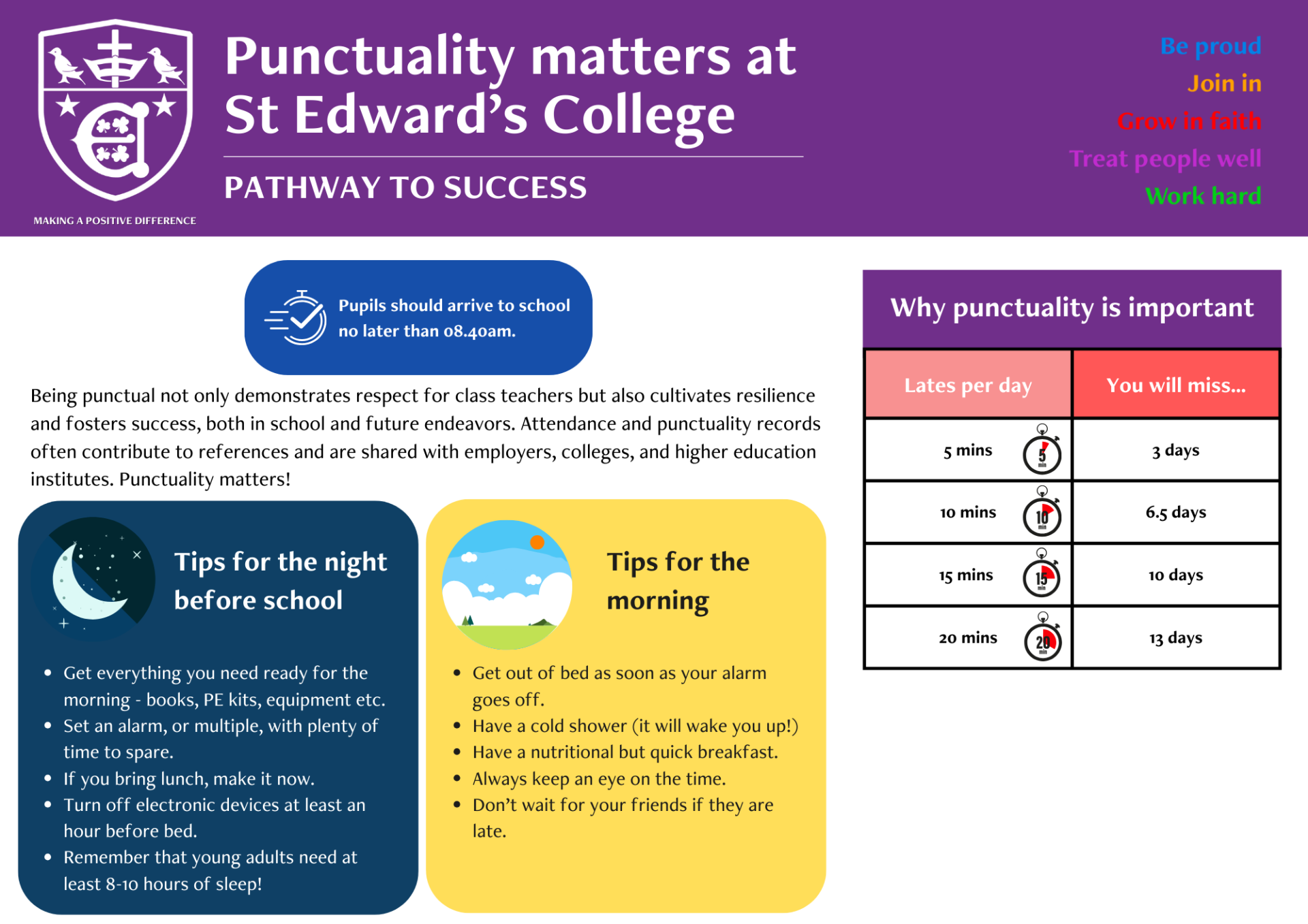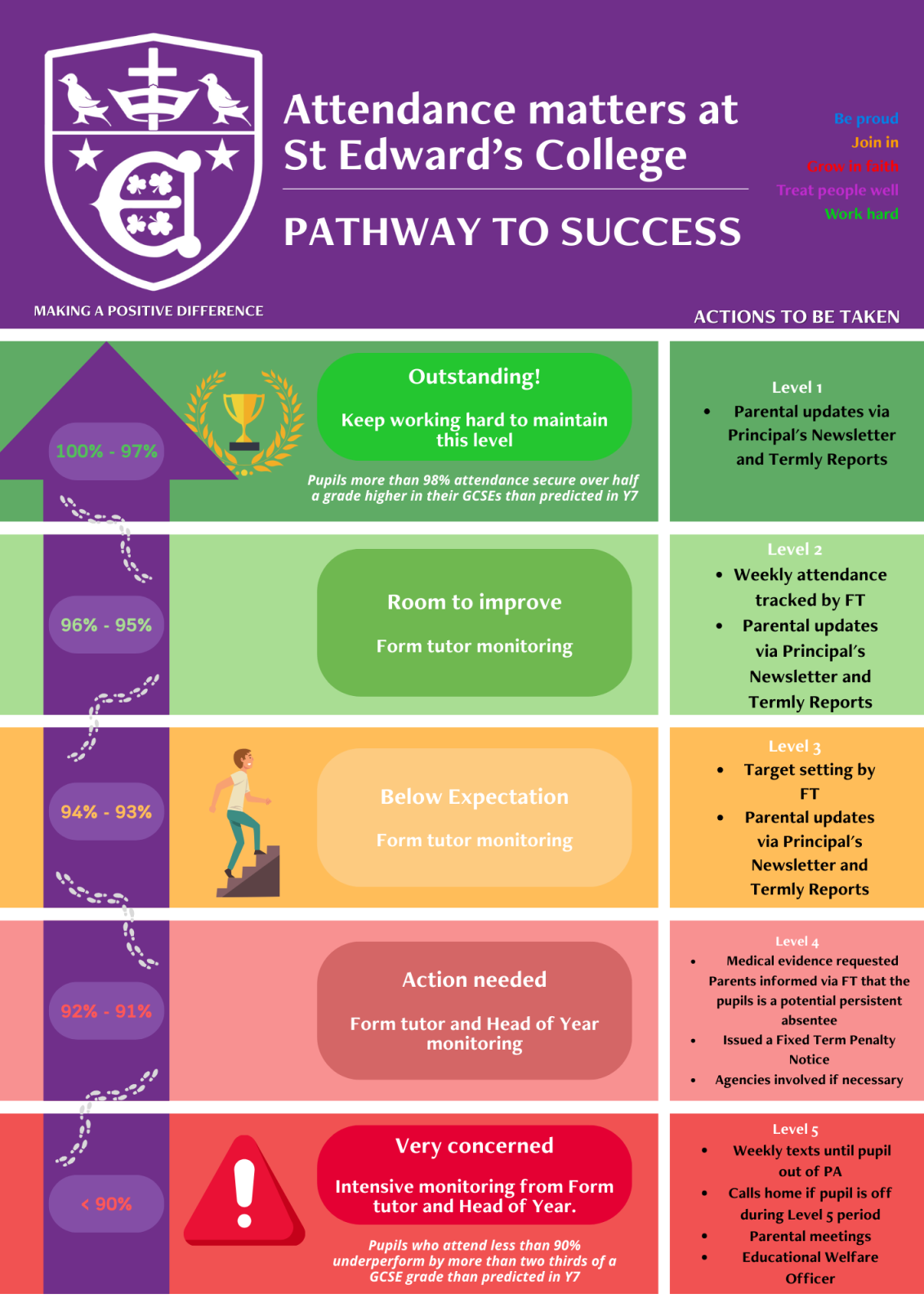Attendance & Punctuality
Everyone at St Edward’s College understands the importance of attendance and punctuality. First and foremost, ‘attendance and being punctual’ are two vital life skills. Attending St Edward’s College is important to your child’s safety, wellbeing, achievement, and wider development.
Everyone at St Edward's College is committed to providing a broad, balanced and effective education for all of our children. In order to maximise our impact and make a positive difference, it is essential that all pupils are in school, on time, every day that school is open unless the reason for the absence is unavoidable.
Here at St Edward’s College, we believe that:
- Pupils are safe when they attend school
- Regular attendance promotes the effective and continuous learning of all pupils;
- Regular attendance promotes positive friendships and well-being;
- Pupils who have high attendance are more likely to achieve their full potential
- Good habits of attendance and punctuality will assist to develop self-discipline and responsibility in preparation for future employment.

All pupils should aim to attend school every day and be on time except where illness makes this not possible. Our aim for all pupils is a minimum of at least 97% attendance.
Attendance Team
Our Attendance Officer is Mrs Maitland (margaret.maitland@st-edwards.co.uk)
Her role is to prioritise excellent attendance and punctuality and work with families and pupils to achieve this.
The attendance officer and pastoral team (Heads of Year and Form Tutors) will monitor attendance closely and will contact parents if there are concerns with a pupils’ attendance.
If these cannot be rectified we will contact the local School Attendance Enforcement Team for support.
How to report my child's absence
- If your child is ill, ensure you call the Absence Line on 0151 254 7444 by 08.30 at the latest. Please make sure you call every day your child is absent.
- Alternatively, you can e-mail attendance@st-edwards.co.uk to report an absence. Again, this must be sent by 08.30 at the latest. Note, e-mails regarding absence will only be accepted from the registered e-mail address on your child's records.
- If no contact is received regarding the absence, it is recorded as unauthorised. A text will be sent home before 10.00 requesting you to contact the Attendance Officer (Mrs Maitland) immediately.
Punctuality
Being 15 minutes late each day is the same as missing two weeks of school over the year. The start of the school day is an important time for pupils to develop their social skills with their peers, as well as preparing them for their learning.
We expect our pupils to be on site at 8.40am every day.
Pupils who arrive after 8.40am in the morning will be marked late. Any pupil who is late 6 times in the morning will be asked to complete an afterschool 90 minute detention
The registers will remain open until 9:10am. Any pupil arriving after this time will be marked as having a ‘U’ mark – this is an unauthorised absence unless an explanation given is accepted as grounds for authorising the late arrival. U codes may lead penalty notices.
Please find below important information from the Local Authority that we are required to share with all parents concerning absence from college.
It is for information only and outlines the actions that could be taken against parents/carers regarding attendance.
The importance of excellent attedance
We expect all pupils and students to aim for 100% attendance. This is the minimum figure at which your child can gain their best possible achievements.
|
Attendance |
Days missed |
Lessons missed |
School Weeks missed |
|
100% |
0 days |
0 |
0 weeks |
|
95% |
10 |
50 |
2 weeks |
|
90% |
19 |
95 |
3 weeks 4 days |
|
85% |
28 |
140 |
5 weeks 3 days |
|
80% |
37 |
185 |
7 weeks 2 days |
The experience at St Edward’s College is that there is a very strong correlation between a pupil’s attendance at school and academic performance and progress. The relationship between attendance and progress is striking. The Progress measure encapsulates a pupil’s progress from Key Stage 2 (i.e. the end of primary school) to GCSE. A positive score indicates a faster rate of progress than expected; such that a score of +0.5 indicates that a pupil has achieved one half of a grade higher, on average, in every GCSE examination than their Key Stage 2 results predicted.
Our data shows that pupils whose attendance was 98% or better in Year 11 secured over half a grade higher in every subject than would be predicted given their prior attainment. Conversely, pupils whose attendance was below 90% underperformed by more than two thirds of a GCSE grade in every subject, than would be predicted given their prior attainment. Bluntly, a 10% differential in attendance correlates with well over one full GCSE grade in every subject.
Good attendance is also vitally important in building relationships and friendships in school. It means pupils do not feel under pressure or at a loss if they have missed work. While our staff will work hard to help pupils and students catch up, it will never be the same as being present at the missed lessons.
Employers greatly value good attendance and punctuality and getting into the routine of learning at school each day is a good grounding and sets up habits which will last for life and increase the future opportunities for your child.

What is a 'persistent absence pupil?
We will continue to closely monitor attendance in school and, where we see attendance falling below 90% (which is classed by the DfE as being persistently absent) you will be contacted to discuss if we can provide any support. If you are having difficulties getting your child to school, please contact us so we can work together to improve.
Missing school will make your child fall behind in lessons and will impact on their academic progress and achievement.
Don’t allow your child to become a PA pupil.
This information below shows how many days missed each half–term will make your child a PA pupil
How many days off will make your child a persistent absence student?
- Half-term 1 - 3 ½ days off school from September until October half-term holiday will make your child a PA pupil
- Half-term 1-2- 7 days off school from September until the Christmas holiday will make your child a PA student.
- Half term 1-3 - 10 days of absence from September until February half-term will make your child a PA student.
- Half term 1-4- Half-term 1-3 12 ½ days of absence from September until the Easter holidays will make your child a PA student.
- Half-term 1-5- 15 ½ days of absence from September until May half-term will make your child a PA student.
- Half-term 1-6 - 19 days of absence for the full academic year (September to end of summer term in July) will make your child a PA student.
Rewarding excellent attendnace

Monitoring Attendance
The pastoral team and the attendance officer will monitor and take action if needed in order to support and improve a pupil’s attendance.

How to improve your child's school attendance and where to get support
We understand that pupils and students do have to take time off school for illness but ask that Parents/Carers do not allow their child to miss school for minor ailments.
The NHS have produced this handy guide to help you:
https://www.nhs.uk/live-well/is-my-child-too-ill-for-school 
If you have any concerns, worries or questions regarding your child’s attendance or punctuality then please speak to your child’s Form Tutor or Head of Year.
Medical appointments
If possible, all appointments should be arranged out of school hours to ensure minimum disruption to your child’s education. When appointments have to be made in school hours a note asking for release must be sent to the attendance officer.
Unauthorised absence
- Unacceptable reasons for absence include
- Shopping
- Holidays in term time which are not authorised by your child's school (see below)
- Hair cut
- Truancy
- Airport visits
- Birthday treats
- Days out / trips
- Looking after brothers and sisters at home
- Non-urgent medical or dental appointments
- Oversleeping
- Working
hOLIDAYS DURING TERM TIME
From 1st September 2013 Department for Education legislation gives no entitlement to parents to take their child on holiday during term time. The Head teacher will not grant any leave of absence during term time (unless there are exceptional circumstances).
Parents must ask the Head teacher for permission in advance in writing who will decide whether the absence will be authorised or not and how many days a child can be away from school if the leave is granted.
If you need to take your child away from school, your child must request a Leave of Absence Form from the school office. You must use this to seek permission from the Principal, at least four weeks in advance of the absence. If you take your child out of school without permission, you may be given a fixed penalty notice.
pENALTY nOTICE










